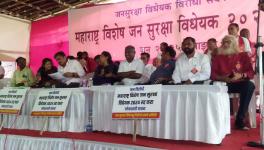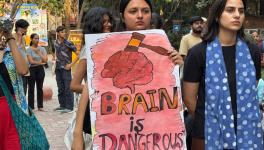What Does Govt ‘Advisory’ to TV Channels to Refrain from Inviting Any Person in Foreign Country Accused of Terrorism Mean?

Image courtesy: The Leaflet
The Union government on Thursday advised television news channels against inviting any person in a foreign country charged with serious crimes or terrorism to debates.
The advisory by the Ministry of Information and Broadcasting (MIB) recommends television channels to refrain from reporting on or referring to the “views or agenda of persons of such background”.
Significantly, the provision under which the ministry states the advisory has been issued allows the Union government to control the transmission of a channel or programme only “by Order”.
In the advisory, the government has claimed that though it is committed to upholding press freedom and respects the media’s rights under the Constitution of India, the content telecast by television channels “must adhere” to the provisions of the Cable Television Networks (Regulation) Act (CTNA), 1995.
The advisory invites attention to Section 20 (power to prohibit operation of cable television networks in public interest), and makes a specific reference to sub-section (2) of Section 20 of the CTNA.
Under Section 20(2) of the Act, the Union government may “by Order” regulate or prohibit the transmission of a channel or programme if it considers “necessary or expedient” to do so.
The government can use this power on the following grounds:
- Sovereignty or integrity of India
- security of India
- friendly relations of India with any foreign State
- public order, decency or morality
The grounds specified in this provision are similar, though not exact, to those laid down under Article 19(2) of the Constitution, which imposes restrictions on the freedom of speech and expression.
The government is also empowered to regulate or prohibit the transmission of a cable television network if it considers “necessary or expedient” to do so in public interest, under Section 20(1) of the CTNA.
To regulate or prohibit transmission in public interest, a notification in the official gazette is necessary.
Since no official Order or gazette notification under the CTNA has been issued by the ministry, the advisory’s prescription cannot be challenged in a high court or the Supreme Court for being violative of Article 19 (protection of certain rights regarding freedom of speech).
Yet, it is possible that the advisory would have the effective result of interfering with the reporting of news relating to persons and organisations that the advisory covers, and press freedom in general.
The advisory informs that it has come to the notice of the MIB that a person in a foreign country against whom there are serious charges of crime and terrorism and who belongs to an organisation prohibited under Indian law was invited to a discussion by a television channel.
While the advisory does not mention any particular person or incident, it is an assumption that the ministry’s concern is with regard to an interview Gurpatwant Singh Pannun gave to the ABP News channel on September 20.
Pannun is the legal advisor and spokesperson for Sikhs for Justice (SFJ), an organisation that promotes the idea of a separate Sikh state, i.e., Khalistan.
Pannun is a notified “terrorist” under the provisions of the Unlawful Activities (Prevention) Act (UAPA), 1967 and Sikhs for Justice is an “unlawful association” under the UAPA Act.
Get the latest reports & analysis with people's perspective on Protests, movements & deep analytical videos, discussions of the current affairs in your Telegram app. Subscribe to NewsClick's Telegram channel & get Real-Time updates on stories, as they get published on our website.























